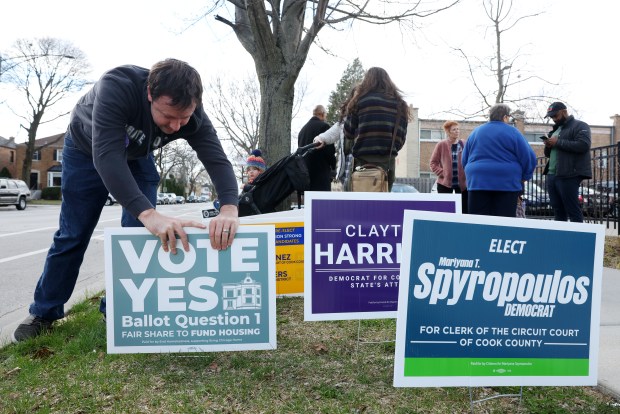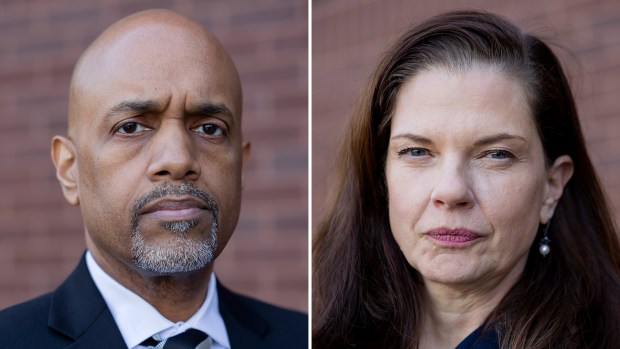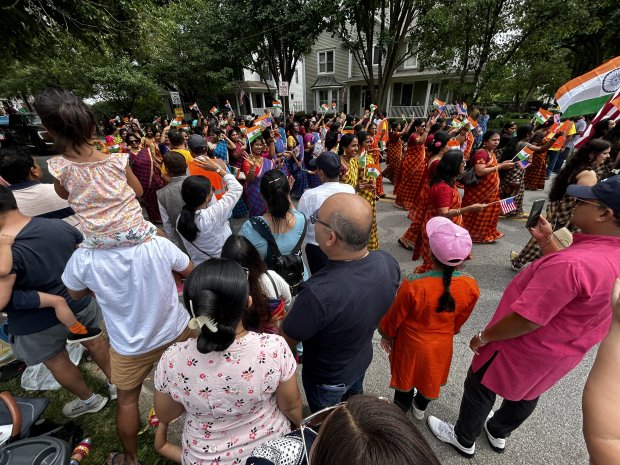Polling places for Illinois’ primary elections opened early Tuesday morning, and despite contested congressional races, an expensive Cook County state’s attorney’s matchup and a rare referendum, officials are expecting a low voter turnout with the presidential nominees for the November general election virtually locked in.
Polls opened across the state at 6 a.m. and will remain open until 7 p.m. Voters in the Chicago area were greeted with freezing temperatures. The weather is expected to warm up into the mid-50s under partly sunny skies, with no rain expected.
The Voting Super Site at 191 N. Clark St. was quiet when polls opened with dozens of volunteers ready to assist voters as they began to trickle in. Across Chicago, voters can access more than 50 early-voting centers in the city or vote at their assigned precincts.
As of Monday night, the city had recorded more than 157,000 early votes through in-person or mail-in ballots. That figure compares to about 244,000 votes that were cast in the city by the day before the 2020 primary. Roughly 109,000 mail-in ballots had yet to be returned, Chicago Board of Elections Chairwoman Marisel Hernandez told reporters Tuesday morning when polls opened.
Hernandez urged voters to return mail-in ballots at a secure drop box at any of the city’s early voting centers or at Wrigley Field, the United Center or Wintrust Arena. Ballots mailed back must be postmarked Tuesday to be counted.
Despite a slow start in early voting, which increased in the 2016 and 2020 presidential election years, officials expect roughly 50% of votes to be cast on election day and remain hopeful for higher turnout numbers, Hernandez said.
“We’re hoping that people will be motivated by all the issues out there in the city and will come out and vote,” she said.
Chicago election officials said Tuesday morning that they are hoping for a higher voter turnout than the 2012 primary election, also a presidential reelection year, which saw 24% of voters cast their ballot with just over 46,000 early-voting and mail-in ballots collected before election day.
Several voters at the Loop Super Site told the Tribune they usually vote early but came out on Election Day this year due to schedule conflicts. In the first hour of open polls, a handful of voters dropped off mail-in ballots at the site’s drop box.
With Democratic President Joe Biden and Republican Donald Trump already having secured enough delegates for nomination, and no statewide races up for election this year the undercard is the story of the 2024 primary. Voters will be deciding November matchups for the U.S. House, all 118 seats in the Illinois House, 23 of the 59 seats in the Illinois Senate, selected county offices, including Cook County state’s attorney and circuit clerk, as well as circuit judgeships.
The Democratic Party race for state’s attorney between former prosecutor and government official Clayton Harris III and former prosecutor and retired Appellate Judge Eileen O’Neill Burke has caught much of the attention.
Chicago voters also will decide the fate of the “Bring Chicago Home” initiative, a referendum question backed heavily by Mayor Brandon Johnson that would give the City Council authority to increase the city’s real estate transfer tax on high-end sales, primarily involving commercial and larger residential properties. As part of the proposal, sales on properties for less than $1 million would see a slightly reduced tax rate, while all properties sold for more than $1 million would see the transfer tax increase. Supporters estimate the hike will generate $100 million, which city officials have said would be used to pay for housing and wraparound services for people experiencing homelessness.
Hernandez called the real estate transfer tax referendum an “historic” referendum, urging voters of any political party to vote on the measure.
“A binding citywide referendum is very rare in our city. Historically, it’s only happened a handful of times,” Hernandez said. “So no matter why, we urge you to come out and be a part of history tonight. No matter your views on any number of issues.”
Chicago voters who request an independent ballot would essentially only vote on the referendum, she said.
Chicago voter Shonda Edwards coordinated with a group of her coworkers to stop at the Super Site early Tuesday before work so she could make her voice heard.
Edwards, a new grandmother, said her concern for the future of women’s rights brought her out to the polls, but not before heavily researching candidates and feeling secure in her choices in the contested races, including for state’s attorney. In that race, she said she voted based on incumbent Kim Foxx’s endorsement of Harris. She hopes others will also do their due diligence and be an active part of the primary election.
“Then when you are watching the news at night, you know you were a part of the voting; you’re not just sitting there and like, ‘I should have voted’ and then you’re mad about the turnout,” Edwards said. “If you’re mad about the turnout, why didn’t you go to influence the turnout?”

Another factor that could tamp down turnout is the growing political divisions between Republicans led by Trump and backed by far-right conservatives, and Democrats moving further leftward in pushing a progressive ideology.
Christopher Mooney, professor emeritus of political science at the University of Illinois at Chicago, said the vast majority of people eschew ideology. That leaves little incentive for those people to vote in primary elections where they must choose a Democratic or Republican party ballot.
“Both sides, they’re driven by an ideology that is baked in and deep. Both sides inform the policy debate as well they should. They have strongly held opinions based on principle. But their principal problem is, that runs up against practical politics,” Mooney said.
“Most people don’t look at politics from an ideological perspective. Most people are not ideologically driven, especially in the state of Illinois, but really all across the United States,” he said. “You know, we fear ideology.”
In January, Gallup said the number of people nationally who identify themselves politically as independents was 43%, trying a record high from 2014, while those classifying themselves as Republicans or Democrats was 27%.
Voters who encounter an issue at a polling location can contact the Board of Elections at 312-269-7870.
Chicago Tribune’s Rick Pearson, A.D. Quig, Olivia Olander and Jeremy Gorner contributed.




